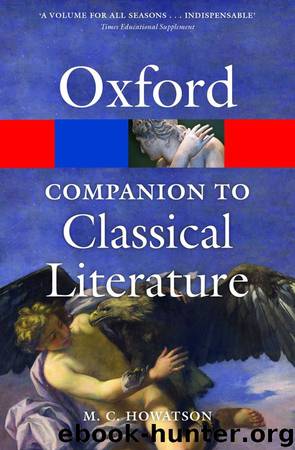The Oxford Companion to Classical Literature (Oxford Quick Reference) by M.C. Howatson

Author:M.C. Howatson [Howatson, M.C.]
Language: eng
Format: azw3
ISBN: 9780191073014
Publisher: Oxford University Press
Published: 2013-08-22T04:00:00+00:00
I
Ia’cchus A supposed Greek deity, invoked by the cry Iacch’ O Iacche during the procession of the initiates from Athens to Eleusis to celebrate the Eleusinian *mysteries. Iacchus was probably a personification of a ritual cry (cf. Hymenaeus; see MARRIAGE SONGS). Later stories made him the son of Demeter, or of Persephone, the goddesses of the Eleusinian mysteries. The name Iacchus, like Bacchus, was also used to refer to Dionysus, who had nothing to do with these mysteries.
Ia’mbē In Greece, a girl after whom the iambic metre is supposedly named. According to the second *Homeric Hymn, to Demeter, her scurrilous jokes made Demeter laugh when she was mourning Persephone. See IAMBIC POETRY.
īa’mbic poetry [Lat. Ĭambi, ‘iambics’] Poetry written in the ‘iambic’ or a closely associated metre. The name comes from iambos, a word connected with scurrilous joking and verbal abuse which had a place in certain Greek religious festivals (see IAMBE). In Ionia in the seventh century BC poems by Archilochus were published which gave literary form to this type of entertainment, which the term ‘iambic poetry’ comes to describe. The three principal archaic writers of iambics (‘iambographers’) are Archilochus (the most versatile), Semonides of Amorgos, and Hipponax; the Margites, attributed improbably to Homer, may be included in this category. In the Hellenistic period iambic poetry was written by, among others, Asclepiades, Callimachus, and Herodas. Callimachus imitated the dialect and diction of Hipponax but Herodas went further and created a new genre, the mimiambos, by writing *mimes (dialogues or monologues) of low-class urban life in the language of Hipponax. The iambic metre was also available (as well as the hexameter or elegiac couplet) for more serious literary forms, for inscribed or literary epigrams. The metre seems also to have suited the requirements of Archilochus, Semonides, and Solon when they wrote their reflective and political poems. It was adopted as the natural metre for the dialogue and monologue parts of Attic tragedy and comedy.
At Rome iambics connoted abusive poetry and so Lucilius was sometimes called an iambographer although he wrote mostly in hexameters. Catullus and Horace both wrote iambics. Horace (in the Epodes) claims to have been the first in Latin to imitate Archilochus and invokes also the spirit of Hipponax, though the earlier Catullus and his contemporaries wrote vituperative iambi which they aimed at contemporary politicians. The Epodes, however, are both broader in theme (like Archilochus’ iambics) and less savage than the poems of Catullus. The Catalepton (attributed to Virgil; see APPENDIX VIRGILIANA) includes several poems in iambic style.
Ia’mblichus (d. c.AD 330) Greek *Neoplatonist philosopher with an interest in magic. Born in Syria, he studied under *Porphyry in Rome or Sicily; later he founded his own school in Syria. Among his surviving writings are an ‘Exhortation to philosophy’ (Protreptikos logos) largely comprising extracts from earlier philosophical works including, it is believed, Aristotle’s Protrepticus (now lost) and therefore valuable as a source-book; a compilation on Pythagoreanism drawn from earlier writers, of which the first four books survive; and a defence of
Download
This site does not store any files on its server. We only index and link to content provided by other sites. Please contact the content providers to delete copyright contents if any and email us, we'll remove relevant links or contents immediately.
4 3 2 1: A Novel by Paul Auster(12392)
The handmaid's tale by Margaret Atwood(7764)
Giovanni's Room by James Baldwin(7346)
Asking the Right Questions: A Guide to Critical Thinking by M. Neil Browne & Stuart M. Keeley(5775)
Big Magic: Creative Living Beyond Fear by Elizabeth Gilbert(5772)
Ego Is the Enemy by Ryan Holiday(5450)
The Body: A Guide for Occupants by Bill Bryson(5097)
On Writing A Memoir of the Craft by Stephen King(4944)
Ken Follett - World without end by Ken Follett(4732)
Adulting by Kelly Williams Brown(4574)
Bluets by Maggie Nelson(4556)
Eat That Frog! by Brian Tracy(4540)
Guilty Pleasures by Laurell K Hamilton(4449)
The Poetry of Pablo Neruda by Pablo Neruda(4109)
Alive: The Story of the Andes Survivors by Piers Paul Read(4033)
White Noise - A Novel by Don DeLillo(4010)
Fingerprints of the Gods by Graham Hancock(4004)
The Book of Joy by Dalai Lama(3986)
The Bookshop by Penelope Fitzgerald(3853)
